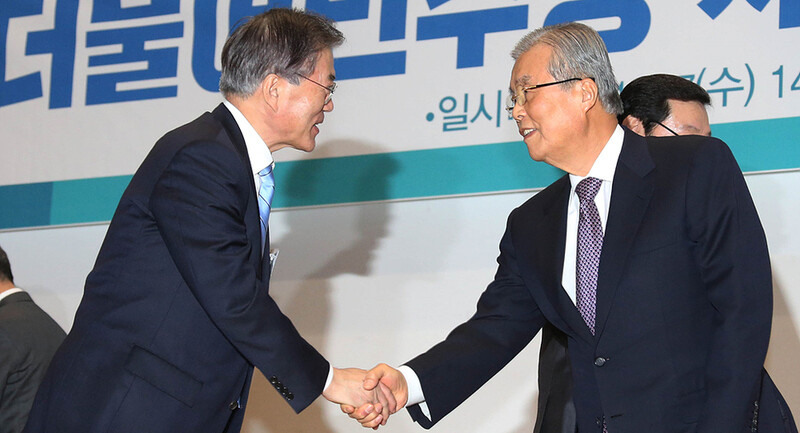hankyoreh
Links to other country sites 다른 나라 사이트 링크
Moon Jae-in steps down as leader of The Minjoo Party of Korea

Moon Jae-in resigned on Jan. 27 as leader of the opposition The Minjoo Party of Korea (TMPK).
His decision ends a 354-day journey that began at a Feb. 8 party convention last year. At a central committee meeting on the afternoon of Jan. 27, Moon relinquished his authority to an emergency committee headed by Kim Jong-in and issued a “farewell letter” to party members on Facebook. In it, he described his year as party leader as “a great honor, and also a painful experience.”
Moon went to cite the defection of lawmakers from the southwestern Honam region and souring sentiments there as the chief sources of that pain. In a message to Honam voters, he wrote, “Whatever the reason, it is my responsibility and my inadequacy that produced this result. I sincerely hope my resignation will be an occasion for soothing that anger.”
Moon also expressed pride in his achievements, writing that he had “observed and practiced principles of innovation even amid the disruptions.”
Moon described his experience as “a series of difficult days without a single one of respite.” Indeed, the party - until recently known as the New Politics Alliance for Democracy (NPAD) - has experienced near-constant frictions and divisions under his leadership. The situation began with by-elections on Apr. 29, just two months after Moon took over as party leader. The party’s non-mainstream wings continued to blame him for the election defeat, prompting Moon to accuse them of trying to upend the party leadership.
An innovation committee under his leadership ran into objections from then-NPAD lawmaker Ahn Cheol-soo. Their clash would ultimately lead to Ahn’s departure in December, with 16 other lawmakers soon following suit, including party heavyweights Kim Han-gil and Park Jie-won.
The criticisms of Moon stem from perceptions that he failed to show the political skill to embrace other factions and ideas. The divisions within what is still the country’s main opposition party also threaten supporters with the likelihood of defeat in the upcoming parliamentary elections on Apr. 13.
“He should have done more to communicate with the non-mainstream wings, or at least shown the skill to keep them in line, but he didn’t do that,” said one TMPK official.
“The chances of a Saenuri Party victory in this election are now looking even better,” the official added.
Despite the body blows he suffered, analysts said Moon did attempt to live up to his stated principles and promises before leaving his post. Examples include nailing down terms in the party constitution and regulations to honor his convention pledge for “system-based” nominations, as well as his much-lauded efforts to find new faces as head of the party’s “talent search” committee. His resignation takes the form of an “orderly departure” of the kind his associates have continually stressed.
Moon announced plans to rest at his home in Yangsan, South Gyeongsang Province, through the Lunar New Year holiday early next month. He has also pledged to serve as a “commoner soldier” helping with anything wherever he is needed to boost the party’s chances of victory in the parliamentary elections. Although he said he has no plans to run again, he has also left the possibility open if the party expresses the need.
But many associates are opposed to another run out of fears that a loss in Busan, a traditionally weak area for the opposition, could prove fatal to a future presidential run.
By Lee You Ju-hyun, staff reporter
Please direct questions or comments to [english@hani.co.kr]

Editorial・opinion
![[Column] Park Geun-hye déjà vu in Yoon Suk-yeol [Column] Park Geun-hye déjà vu in Yoon Suk-yeol](https://flexible.img.hani.co.kr/flexible/normal/500/300/imgdb/original/2024/0424/651713945113788.jpg) [Column] Park Geun-hye déjà vu in Yoon Suk-yeol
[Column] Park Geun-hye déjà vu in Yoon Suk-yeol![[Editorial] New weight of N. Korea’s nuclear threats makes dialogue all the more urgent [Editorial] New weight of N. Korea’s nuclear threats makes dialogue all the more urgent](https://flexible.img.hani.co.kr/flexible/normal/500/300/imgdb/original/2024/0424/7317139454662664.jpg) [Editorial] New weight of N. Korea’s nuclear threats makes dialogue all the more urgent
[Editorial] New weight of N. Korea’s nuclear threats makes dialogue all the more urgent- [Guest essay] The real reason Korea’s new right wants to dub Rhee a founding father
- [Column] ‘Choson’: Is it time we start referring to N. Korea in its own terms?
- [Editorial] Japan’s rewriting of history with Korea has gone too far
- [Column] The president’s questionable capacity for dialogue
- [Column] Are chaebol firms just pizza pies for families to divvy up as they please?
- [Column] Has Korea, too, crossed the Rubicon on China?
- [Correspondent’s column] In Japan’s alliance with US, echoes of its past alliances with UK
- [Editorial] Does Yoon think the Korean public is wrong?
Most viewed articles
- 1‘We must say no’: Seoul defense chief on Korean, USFK involvement in hypothetical Taiwan crisis
- 2N. Korean delegation’s trip to Iran shows how Pyongyang is leveraging ties with Moscow
- 346% of cases of violence against women in Korea perpetrated by intimate partner, study finds
- 4[Column] Park Geun-hye déjà vu in Yoon Suk-yeol
- 5‘Weddingflation’ breaks the bank for Korean couples-to-be
- 6Will NewJeans end up collateral damage in internal feud at K-pop juggernaut Hybe?
- 7Amnesty notes ‘erosion’ of freedom of expression in Korea in annual human rights report
- 8[Interview] Dear Korean men, It’s OK to admit you’re not always strong
- 9Korean government’s compromise plan for medical reform swiftly rejected by doctors
- 10[Editorial] Japan’s rewriting of history with Korea has gone too far